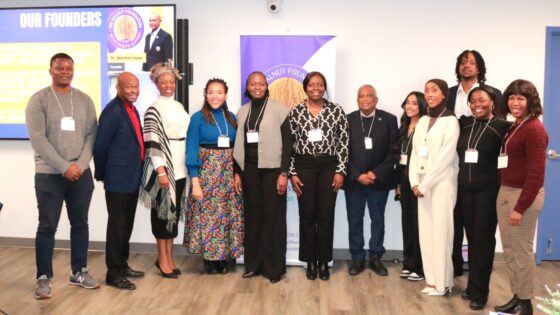on
BY: DELLIA RISMAY
Jerk Chicken: it’s about as synonymous with Caribbean culture as Soca music or Carnival. The dish is believed to have gotten its name from the Spanish word “charqui”, which translates to dried or jerked meat (this later became “jerky” in English), and from the act of jerking the meat with a sharp object so that the flavours would be more readily absorbed. Its distinct, smoky flavour is a staple of barbeques, parties, and even regular lunches and dinners throughout the Caribbean, the diaspora, as well as internationally. With summer (aka barbeque season) just around the corner, you’re sure to catch a whiff of some delicious jerk chicken being smoked on a grill, especially if you’re in the vicinity of Baker’s Jerk House.
Kirk and Dion Bakers, the husband and wife masterminds behind Baker’s Jerk House, both hail from Clandon, Jamaica, which is located in the parish of Manchester, and is about thirteen kilometres away from Mandeville. Both moved to Toronto’s west-end, with Dion arriving in 1988, and Kirk arriving in 1994. The pair met while they were both living in the same apartment building, and a connection was formed.
A flair for food and for hosting was the springboard that launched Kirk and Dion into eventually opening their own restaurant. After preparing food for their own parties, they decided to venture off into the restaurant business. But their love of food was deeply established well before the two had even met. Dion was a cook, as was Kirk back in Jamaica; he has been preparing food since the tender age of eight. “It was natural for me,” he explains. At Baker’s Jerk House, the recipes used are ones that were passed down from Kirk’s grandmother to his mother, and then to him. As many people in Kirk’s family were cooks—his mother was a cook in the Bahamas—it isn’t surprising that he ventured into the world of food.
Although, like many of us, the path to his true calling took a bit of time for him to find. “I wanted to open a gym some years back when I was younger, because I was always about health,” Kirk says. “But I always had a love for food and serving people, and making people happy.”
Eventually, Kirk returned to his passion and opened a restaurant with Dion, and that came with a set of challenges as well. The pair wanted to step outside of the box and introduce some not-so-average menu items, like their jerk breast option but were faced with hesitation from diners. “No other Jamaican restaurant does it. We tried to sell it…in the first two to three years, it didn’t do well,” he says. However, with some creative thinking, the item took off. The restaurant started working with LA Fitness, handing out samples to gym-goers, and soon, the unconventional, flavour-packed lean option was flying off the grill.
In fact, the restaurant has seen their success translate to concrete recognition. In 2008, Baker’s Jerk House got second place in Jerk Fest Toronto, a festival that invites “Jerkologists” to come and test their chops against their competitors. But the restaurant didn’t stop there: they went on to win first place in 2009. But Kirk knows none of that success would have been possible without their loyal customers. “It’s [because of] their feedback,” says Kirk. “A lot of customers tell us what they like, and we cook it with great respect. We go by what they tell us.”
That official recognition along with the feedback and support the restaurant has received from its clients is what drives Kirk to strive for even more for Baker’s Jerk House. The restaurant also has a food truck and was the first Jamaican restaurant in Brampton to have one. They rolled it out last year (you may remember seeing it at the Toronto Caribbean Carnival Parade), and will be using it again during many festivals this summer. And marketing isn’t the only vision Kirk has. Hoping to help shape the future of Caribbean cooks in the Brampton area while giving back to the community at the same time, Baker’s Jerk House also takes on high school co-op students. “We’re one of the few Jamaican restaurants that do it,” Kirk explains. “We have eight kids graduating through us, with the Peel District School Board. So, we help out the community a lot.”
The co-op students Kirk and Dion mentor in their restaurant aren’t the only youth involved in the business. The couple also has four children together, the youngest being seven years old, and the eldest being twenty-one. “They all help out!” Kirk says. “Even the younger ones. They’ll wash the forks. They’ll help me out as much as they can, but they also love to eat! That’s the part that they love!”
There might even be a chance that one day, we will be seeing one of the younger Bakers open up their own establishment. “Every so often, they’ll mention something about opening their own restaurant one day, or that they’d like to help me out when I get older,” says Kirk.
For now, though, the team at Baker’s Jerk House is preparing to celebrate their tenth anniversary, coming up in September. To celebrate, the first fifty people in line (on a date that is to be announced) will receive a free meal.
With no shortage of Caribbean food options across the GTA, what makes Baker’s Jerk House stand out from the rest? They have rare options, like their jerk chicken breast, but they also created their own dish, called the House Patty. They fill a patty with their signature pasta salad, which is made from scratch, add some sauce, and place it all inside some coco bread. “It’s an explosion!” Kirk explains.
Baker’s Jerk House also sets itself apart from others with their emphasis on quality and service. “We have a great outlook on health, in terms of food, and quality, in terms of seasoning, because some people over-season,” Kirk says. “Some people don’t eat at their own restaurant, but we give you what we eat. We give you the finest product, like it’s a fine-dining restaurant, even though it’s take-out. And we are extremely friendly. You get good service and good food!”
Stay in the loop with exclusive news, stories, and insights—delivered straight to your inbox. No fluff, just real content that matters. Sign up today!
Sleepless In Credit













